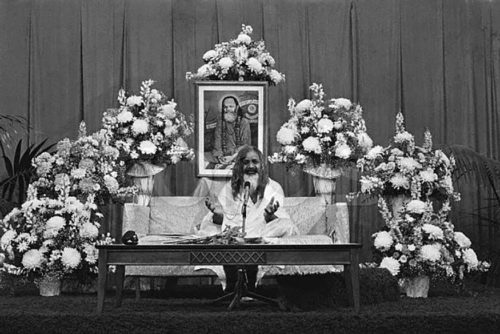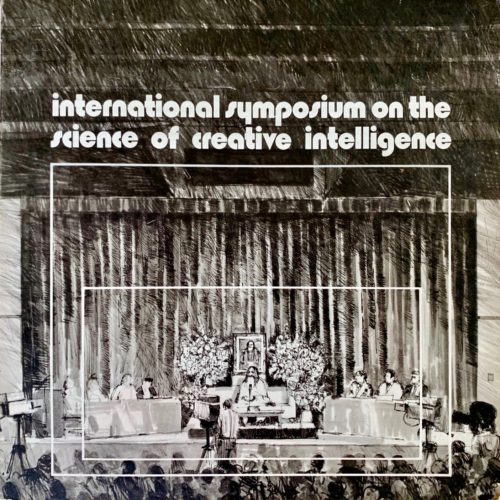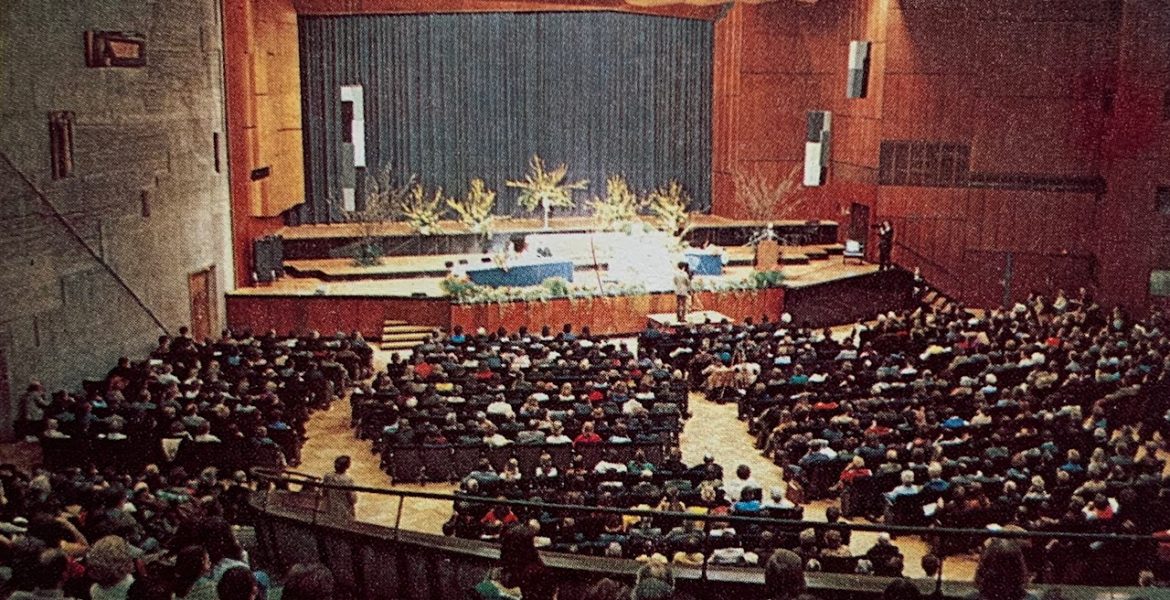Rhoda Orme-Johnson, Ph.D, Professor Emerita of Literature, Maharishi International University (MIU), explains the fascinating backdrop to the emergence of MIU’s consciousness-based literature department in the 1970’s. The article acts as an introduction to the enlightening book, “The Flow of Consciousness – Maharishi Mahesh Yogi on Literature and Language”.
Featured image above: In 1971, Maharishi presented a new perspective on literature and language, based on Vedic Science at symposia on the Science of Creative Intelligence.
Establishing MIU’s Literature Department
With the founding of Maharishi International University (MIU.edu) in 1973 and the development of the first curriculum-catalogue, came the necessity to educate everyone about the evolution of consciousness and the nature of life. In order to guide the new faculty of MIU on how we might connect our disciplines (for example, Physics, Chemistry, Business, the Arts…) with the laws of nature governing life from the field of consciousness, Maharishi began to host symposia with experts from all fields of knowledge. He would then give his insights into their whole field, always delving into the deepest aspects of their areas of knowledge and adding something profound from the level of Vedic Science.
My husband, (David Orme-Johnson Ph.D, MIU Professor of Psychology), and I were staying with Maharishi and a group of MIU professors in Arosa, Switzerland in the summer of 1974 when Prof. Erika Lorenz of the University of Hamburg came to visit. She presented a talk on poetry, on how it affects the consciousness of the listener, how the rhythms echo the beating of the heart. Maharishi was delighted with the talk and especially how she described the way the poet takes the listener or reader from concrete expressions to more abstract emotions and ideas. “This is what cultures emotions,” he said. “This is what sharpens intelligence. These are the values of studying literature.”

Maharishi described the way we transcend to subtler states of consciousness when we meditate, and then return to more active levels of consciousness, and then compared this process with the values of studying literature, and, in fact, with all of education. The teacher takes the students from concrete to abstract, and in the process, their consciousness is expanded, purified, and cultured. “It is the excellence of the literature teacher that gives those beautiful, delightful jerks to the emotion and intellect of the students. . . The whole awareness shakes, and the quicker it shakes, the faster the speed of evolution of the student.”
Could this be the way that literature works? Could these principles be applied to the study and teaching of literature? What exciting ideas! When I began to teach at MIU with the other literature faculty, we played these audio or video-taped lectures to the students to inform their understanding of what they were reading and writing about.
Maharishi talked about the creative process, explaining that all the aspects of a piece of writing “come together in a very beautiful, connected manner if there is silence deep within.” The essential force of a work of literature, he went on to explain, “lies in the purity of consciousness of the writer who is able to bring an ocean in a drop, to see the ocean in a drop.”
He addressed the area of creativity and suffering, particularly the notion that the writer needs to suffer in order to write. (“Not so” he emphasized). He explored poetry from the angle of the poetry of the Vedas, principles of communication, language and climate, and dipped into such esoteric topics as the relationship between name and form in Vedic Science (Ritam Bhara Pragya), the phonology of creation, and he analysed the roots of the syllables and went into Vedic grammar.

Gathering the Knowledge
We thought it would be a great help to the students, and to literary scholars everywhere to have the texts of these talks so they could study them and refer to them in their own writing. “Could I transcribe them and put them into a volume”, I asked. Maharishi agreed and encouraged me to do so. Transcribing the tapes was like sitting at his side, hearing his voice, his inflections, his laughter. Reading these transcripts has the same effect on me today, and, others have told me, on them.
Once the tapes were transcribed, I set about out editing and annotating the seven talks that were addressing literary concerns and writing a summary of the main ideas that appeared in a number of them. My colleague Susan Andersen agreed to annotate the seven talks about communication, language, and the profound levels of sound at the basis of consciousness and creation, and to write an introduction to those talks summarizing the main ideas.
I then wrote a general introduction to the volume, “Maharishi Mahesh Yogi and his Worldwide Transcendental Meditation Movement”, introducing the major milestones of the exposition of the Vedic knowledge that occurred over the next thirty or more years. I was hoping to introduce the general reader, and even the non-meditator, to Maharishi as the important Vedic scholar that he was and to appreciate his contributions to Western knowledge as well. I had hoped that other faculty would gather Maharishi’s talks together in their areas and publish future volumes. This is gradually being done. The MIU Art Faculty has prepared a beautiful compendium of Maharishi’s insights into the creation and appreciation of art. See The Unmanifest Canvas: Maharishi Mahesh Yogi on Art, Creativity and Perception.
It then remained to add an Appendix in order to briefly introduce the Transcendental Meditation and TM-Sidhi programmes to new readers, to provide an understanding of higher states of consciousness (illustrated and informed by lines from Western literature from Thoreau to Eugene Ionesco to Juan Ramon Jimenez), and finally, to give a brief overview of the scientific research relevant to the ideas expounded in the volume. That was in 2010, and the research has continued to pour out, expanding into new areas of related interest (e.g., brain functioning and the default mode network). See www.TruthaboutTM.org for this evolving field.
Literature as a Means to Expand Consciousness
As stated on the back cover of the book:
“Over the years, Maharishi Mahesh Yogi recorded brilliant and inspiring lectures on the literary process, as well as on critical theory and technique, emphasizing the relevance of the state of consciousness of both writer and reader. He explained how only from an expanded basis can the writer spontaneously experience and express refined emotions and ideas, and only from such a basis can the reader hope to understand and enjoy such writings. A fully developed consciousness can express the ocean in a drop, and from that drop flows a river of meaning, power, and enjoyment. Literature itself can be a means to evolve one’s consciousness through sound, rhythm, and meaning, swinging the reader’s attention from concrete to abstract, thus purifying consciousness and producing bliss.
Immersing oneself in the transcripts of Maharishi’s lectures allows readers to feel his presence, to hear his voice, his rhythms of speech, his humor, and to appreciate his skill as a teacher. His exposition of the power of poetry, particularly the poetry of the Vedas, gives the reader a taste of his intellect and his profound understanding of language and literature. It is a journey through a great mind and an exploration of a topic familiar and beloved by all.
This volume is a valuable resource for teachers, students, and all readers of literature, to all those interested in higher human development and the literary process.”

AAE: Grateful appreciation to Dr Orme-Johnson for her insightful article, with its behind the scenes glimpse into the founding of Maharishi International University over four decades ago. Today, MIU leads the world as the premier consciousness-based educational institution, with its outstanding record of academic achievements and research. Her book on Maharishi’s knowledge of literature and language is a gift of enlightenment for the ages to all writers and lovers of the Arts.
The Flow of Consciousness – Maharishi Mahesh Yogi on Literature and Language is available from: https://miupress.shop/other-authors/the-flow-of-consciousness.html

